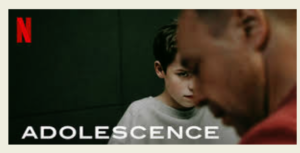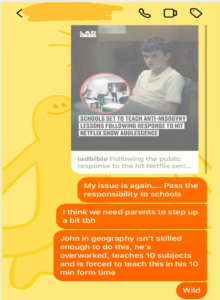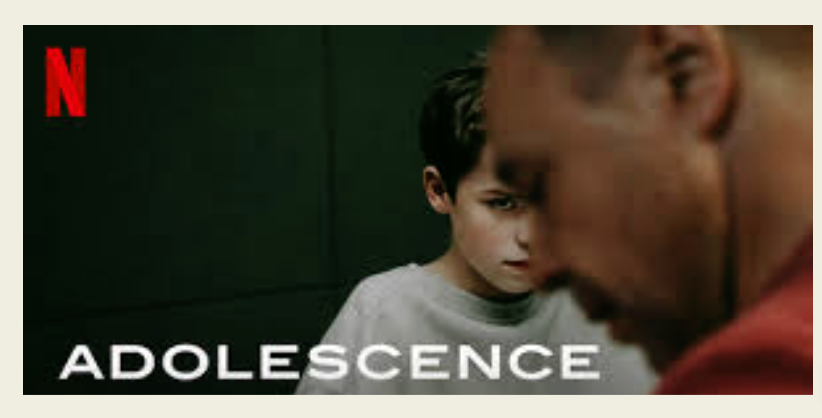Whose Responsibility is it?

Subject – Teaching Misogyny in Schools
Prerequisites Before Writing This Article
Ok, so a few of prerequisites before I write this article:
- I haven’t watched Adolescence yet, so I can’t actually comment much on the series, despite having a lot of conversations around it recently.
- I have worked as a school teacher for 10 years, so I know exactly what goes on behind closed doors.
- I have teenage siblings, cousins, and many friends who are parents, many of whom are terrified by what they are beginning to understand about the world of a teenager behind the screen.
My health teacher friend sent me the following message (see screenshot), and this is ultimately what I am responding to in this article.
The Overburdened Teacher: Another Responsibility?
If I’m being honest, my initial reaction to the message was frustration. Schools are already overwhelmed with responsibilities, and the people working in them are exhausted, burnt out, and often ill-equipped to deliver sensitive and nuanced content like this. That’s not to say they shouldn’t be addressing it, but before we hastily add another topic to the curriculum and offload responsibility onto schools, we need to pause and ask some crucial questions:
1. Have Teachers Had the Appropriate Training?
The reality is, most teachers are not trained psychologists, sociologists, or gender studies experts. They are subject specialists, many of whom are already juggling excessive workloads. Without proper training, asking teachers to tackle issues of misogyny, consent, and online culture is setting them up to fail, and, by extension, setting students up to receive inconsistent and potentially harmful messaging. Too often, crucial content like this is crammed into a 10-minute form period while teachers juggle multiple other responsibilities; taking attendance, reading the daily bulletin, managing behaviour, and mentally bracing for the 1,000 emails they need to respond to regarding concerns about students. Teachers are already struggling under immense pressure, and their well-being is at risk.
2. Shouldn’t Parents Play a Role Too?
Schools can’t be the only place where young people learn about respect, boundaries, and relationships. Parents and guardians must also engage in these conversations at home. But do they feel equipped? And if not, how do we support them to take responsibility for these crucial discussions? The answer isn’t immediately schools… it is a societal responsility that we must all contribute to.
3. Why Don’t Schools Have Health Specialists for This?
You childs PSHEE lessons / 10 minutes during form time is often delivered by teachers who have no specialist training. If we recognise this as essential learning, why don’t we invest in experts, trained professionals who can provide consistent, informed guidance rather than leaving it to overstretched classroom teachers?
4. Is This Even Valued in an Exam-Driven System?
Schools are under relentless pressure to deliver academic results. Teachers are expected to prioritise exam success over all else. When time is already stretched thin, where does that leave space for meaningful discussions about misogyny, toxic masculinity, and online culture? Do policymakers truly value this kind of education, or is it just an afterthought tacked onto an already overloaded system?
5. Why Aren’t We Prioritising People Skills in an Age of Instant Information?
Young people have unprecedented access to information; often before adults even know what’s out there. If we want to combat misogyny, isn’t the real challenge teaching critical thinking, empathy, and interpersonal skills? Shouldn’t we be focusing on emotional intelligence and media literacy rather than assuming a teacher-led classroom lesson can fix deeply ingrained societal issues?
The Bigger Question: What’s the Solution?
The answer isn’t simple, but it starts with acknowledging that this isn’t just a school issue, it’s a society issue. We need a holistic approach that includes:
- Training for teachers who are expected to address these topics.
- The education system needs a revamp with a focus on being “humans” not numbers.
- Active involvement from parents, with resources to help them navigate difficult conversations.
- Investment in health specialists who can deliver this education effectively.
- A broader cultural change that challenges harmful norms and promotes respectful relationships.
- A recognition of teacher well-being, ensuring they have the time, resources, and support to deliver these lessons meaningfully.
So before we dump yet another responsibility onto already overstretched teachers, let’s ask: Whose responsibility is this, really?
If you are a parent or a teacher who has resonated with this blog post, please share it and tag me.
@_celestegardner
www.celestegardner.com
